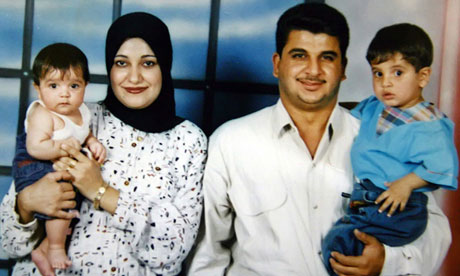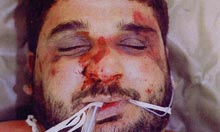constant calls for hanging deprive one of light
freewill and forgiven
those without sin caste the first stone
http://www.guardian.co.uk/uk/2013/may/24/uk-inquests-civilian-deaths-iraq-warUK ordered to hold inquests into civilian deaths during Iraq war
High court rules that up to 161 allegedly unlawful killings by British military should be subject of coroner-style hearings
Ian Cobain
guardian.co.uk, Saturday 25 May 2013 02.17 AEST

Baha Mousa pictured with his wife and children. Several other Iraqis are thought to have been beaten to death in a manner similar to him. Photograph: Reuters
A series of public inquests should be held into the deaths of civilians who are alleged to have been killed unlawfully by the British military following the 2003 invasion of Iraq, the high court has ruled.
In a ground-breaking judgment that could have an impact on how the British military is able to conduct operations among civilians in the future, the court ruled on Friday that up to 161 deaths should be the subject of hearings modelled upon coroners' inquests.
In practice, a series of hearings – possibly amounting to more than 100 – are likely to be held as a result of the judgment, which follows a three-year legal battle on behalf of the Iraqis' families.
Each hearing must involve a "full, fair and fearless investigation accessible to the victim's families and to the public", the court ruled, and should examine not only the immediate circumstances but other issues surrounding each death.
As a first step, the court ordered Philip Hammond, the defence secretary, to announce within six weeks whether any of the deaths are to result in prosecutions, or to explain any further delays over prosecuting decisions.
After years of judicial review proceedings, and in the face of determined opposition from the Ministry of Defence, which appeared anxious to maintain control over any investigative process, the court concluded that hearings modelled upon coroners' inquests were the best way for the British authorities to meet their obligations under article 2 of the European convention on human rights (ECHR), which protects the right to life.
The court rejected calls for a single public inquiry to be held to examine British military detention and interrogation practices during the six-year occupation of the south-east of Iraq, on the grounds that such an inquiry would take too long and cost too much.
The first public hearings are expected to focus on 11 cases in which civilians died in British military custody. These will be followed by public examinations of other incidents in which civilians died – often in circumstances that were unclear or are disputed – but where it is alleged that British personnel used unlawful force.
The court also ruled that this should be just the start of the process by which public hearings will examine the alleged misconduct of some members of the British armed forces who served in Iraq.
Following the completion of the Article 2 hearings – into allegedly unlawful killings – further hearings should be established in order to meet the UK's obligations under Article 3 of the ECHR, the court said. These will inquire into allegations of torture and lesser mistreatment of individuals detained by British troops in Iraq, focusing on a sample of the most serious of the 700-plus cases in which such allegations have been made.
In December last year the MoD said it had paid out £14m in compensation and costs to 205 Iraqis who alleged unlawful imprisonment and mistreatment, and that it was negotiating a further 196 payments. Several hundred more claims were expected to be lodged.
Many of the hearings that examine allegations of torture and mistreatment are expected to shed light on the activities of a British interrogation unit known as the Joint Forward Interrogation Team, whose personnel, drawn from all three branches of the services, appear to have received training in the abuse of prisoners.
The deaths in custody include those of a number of teenagers who drowned after allegedly being pushed into canals.
In another case, an RAF police investigation into the death of a man who was allegedly kicked to death while on board an RAF helicopter failed to establish the cause of death, or even the dead man's name. A Guardian investigation established that there were concerns that MoD officials may have interfered with the initial investigation because they feared a prosecution could lead to the discovery that the dead man – and large numbers of other prisoners – were being ferried to a secret interrogation centre that had been concealed from both British army lawyers and the Red Cross.
A third case concerns a mother who was shot and wounded in November 2006 when troops raided her home. She was certified dead on arrival at a first aid post, and her body was later dumped at the side of a road in a British army body bag.

Baha Mousa. Photograph: Liberty/PA
Several other victims died after being detained for interrogation, and are thought to have been beaten to death in a manner similar to that of Baha Mousa, the Basra hotel receptionist who was murdered by British soldiers in September 2003.

 Forum
Forum

 Home
Home 

 Album
Album 

 Help
Help

 Search
Search

 Recent
Recent 

 Rules
Rules 

 Login
Login

 Register
Register





 Pages:
Pages: 

